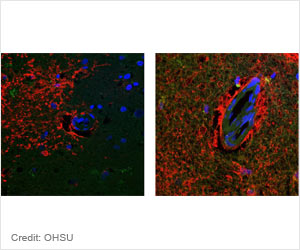Commonly used benzodiazepine sedatives are found to increase the risk of pneumonia in patients with Alzheimer’s disease.

- Alzheimer’s disease is a neurodegenerative disorder and is the most common type of dementia.
- New study finds commonly used benzodiazepine sedatives to be associated with increased risk of pneumonia in patients with Alzheimer’s disease.
- Dementia in Alzheimer’s patients may cause aspiration pneumonia when the food or saliva reaches the windpipe instead of reaching the food pipe.
"Benzodiazepines and non-benzodiazepine drugs (Z-drugs) are frequently prescribed for this population, and long-term use is typical. Pneumonia often leads to admission to hospital, and patients with dementia are at increased risk of death related to pneumonia."
Link Found Between Alzheimer’s Drugs and Pneumonia
The research team looked at the data collected from national registries on 49,484 adults who were living in the community with Alzheimer’s disease between 2005 to 2011 in Finland.
The subjects were about 80 years old and around 62.7% of them were women. Of these people around 5232 patients were taking benzodiazepine drugs and 3269 patients took nonbenzodiazepine drugs while the remaining people did not take any drugs.
Study Findings
The findings of the study depicted that
- People who took benzodiazepines were associated with 30% increased risk of pneumonia in patients with Alzheimer’s disease.
- The risk was the highest when taken at the start of the treatment.
The author finally concludes that, "Benefits and risks of the use of benzodiazepines should be carefully considered for patients with Alzheimer disease and include risk of pneumonia."
Sedatives are drugs that are found to depress the central nervous system. Benzodiazepines, barbiturates are some sedatives that are prescribed for treating anxiety, insomnia and other conditions.
Examples
- Benzodiazepines - Lorazepam, diazepam, clonazepam
- Barbiturates - Phenobarbital, secobarbital, mephobarbital
Pneumonia causes serious infection in the upper respiratory tract. It usually occurs in people who have a weakened immune system, or health conditions like Alzheimer’s disease or dementia.
Aspiration pneumonia occurs more commonly in Alzheimer’s patients due to dysphagia condition which causes difficulty in swallowing. The food reaches the windpipe instead of going into the food pipe.
It is considered to be one of the most common cause death among Alzheimer’s patients.
Symptoms of Pneumonia
- Cough
- Breathing difficulty
- Fever
- Rapid heartbeat
- HeidiTaipalePhD Pharm et.al 'Risk of pneumonia associated with incident benzodiazepine use among community-dwelling adults with Alzheimer disease', CMAJ2017 April 10;189:E519-29 doi: 10.1503/cmaj.160126
- 2017 Alzheimer's Disease Facts and Figures - ( http://www.alz.org/facts/)
- Sedatives and Tranquilizers - ( http://www.mass.gov/eohhs/gov/departments/dph/programs/substance-abuse/stop-pill-abuse/drug-facts/sedatives-and-tranquilizers.html)
- What causes pneumonia in people with dementia? - ( https://www.unforgettable.org/blog/what-causes-pneumonia-in-people-with-dementia/)
Source-Medindia















